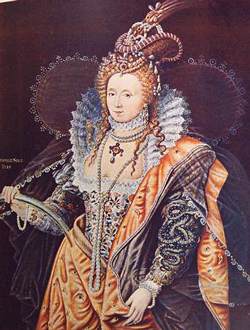Religion, power, and Parliament
From the time of Henry VIII, power over both State and Church became more centred in the hands of the monarch. Here is a summary of the most important Acts of Parliament on these issues.
- Henry VIII:
- The Act of Appeals* (1553)
- The First Act of Supremacy* (1534)
- The Treason Act* (1534)
-
Edward VI:
- The Acts of Uniformity* (1549, 1552)
-
Mary I:
- The Statutes of Repeal* (1553-58)
- Elizabeth I:
Footnotes
-
The Act of Appeals
All legal matters in England, secular and religious, were brought under the King's jurisdiction alone. Henry's divorce could be settled without recourse to a foreign court, but the resulting confusion between religious and secular authority plagued his successors. Henry was excommunicated.
-
The First Act of Supremacy
The King denied all papal authority and was recognized as the supreme head of the Church of England. The Act assumed that English monarchs had always held this authority, and that it had merely been usurped by the Pope. The Church remained Catholic, but the Pope was no longer its head. Henceforth, the English monarch had full powers to determine Church doctrine and to appoint officials.
-
The Treason Act
It was declared treason to speak against the Act of Supremacy, accuse the king of heresy, or deprive his heirs of their rightful authority over the Church.
-
The Acts of Uniformity
Under Edward VI, there were two Acts of Uniformity:
1: (1549) Archbishop Cranmer's first Book of Common Prayer was used to standardize Anglican worship along Protestant lines, but left certain areas of doctrine ambiguous (concerning the Eucharist, for example); radicals were disappointed and Catholics found it offensive. Authority to change Church doctrine passed unnoticed into the hands of Parliament by this precedent.
2: (1552) A revised version of the Prayer Book was adopted; it rejected the doctrine of transubstantiation--the worship of bread and wine as the body and blood of Christ--and thus altered the ritual of communion. Clerical marriage became legal, church plate was confiscated and ritual images began to be removed or destroyed (iconoclasm).
-
The Statutes of Repeal
The Reformation was temporarily reversed, with the repeal of all prior legislation and the reestablishment of the Pope as head of the English Church.
-
The Acts of Supremacy and Uniformity
Control of the Church was restored to the monarchy and the second Prayer Book was adopted with revisions agreeable to moderates: the Black Rubric was removed, leaving the ritual of the Eucharist ambiguous, and Catholic Church ornaments were reinstalled.
Attendance at church on Sundays was mandatory and "recusants"--those who failed to attend--were subject to a shilling fine per absence. (Both Shakespeare's father and his daughter were forced to pay fines for recusancy.) Oaths had to be sworn to uphold both Acts, and bishops who refused to do so were deprived of their positions.
The Black Rubric
The notorious Black Rubric was a clause clearly stipulating that the sacramental bread and wine were not to be worshipped as the flesh and blood of Christ.
